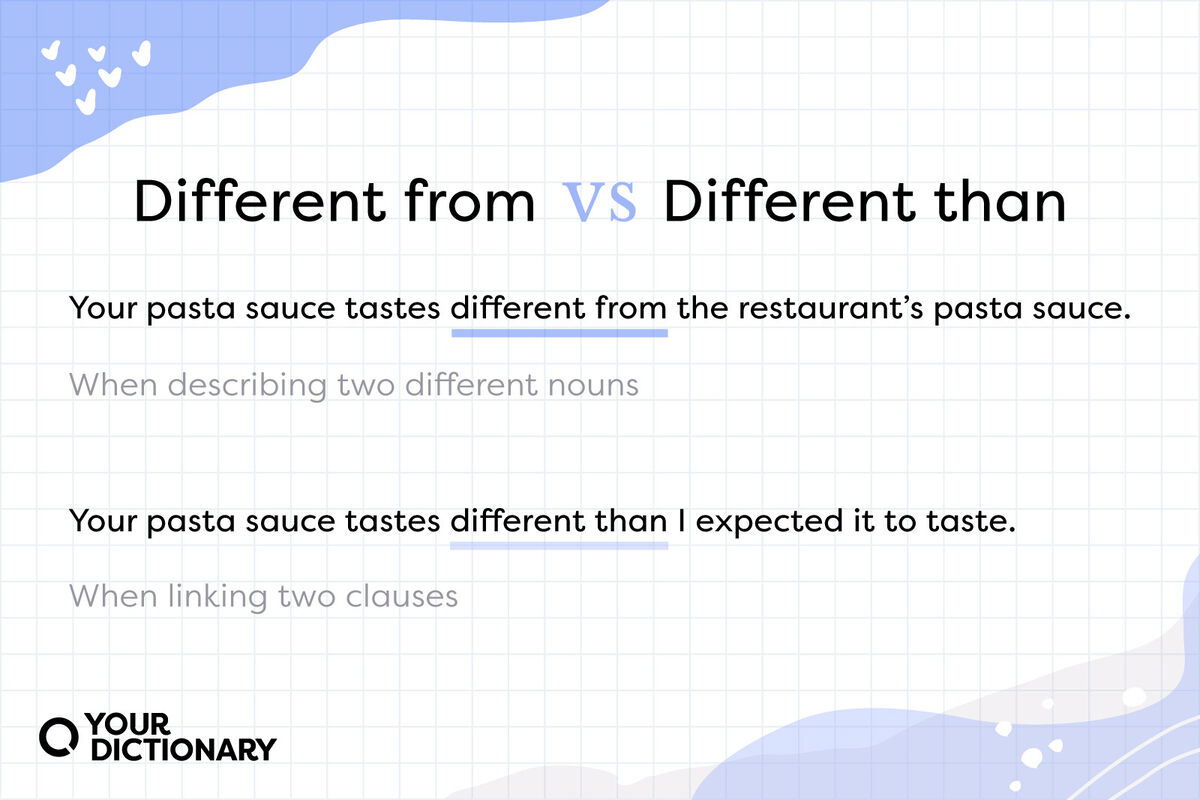
Which one sounds correct: “I’m different from my brother” or “I’m different than my brother”? Some people consider both sentences equally correct, while for others, one sounds so wrong that it hardly looks like English at all. (And if you’re one of those people, you’re probably used to your sophisticated grammar sense being a little different from casual speakers, anyway.) Most often, different from is the preferable choice — but those times may be different than you think.
Use ‘Different From’ When Describing Nouns
In American English, the adjective phrase different from is the preferred way to differentiate between two nouns. It’s more popular and more widely accepted than different than. While different from typically follows forms of the verb “to be,” it can follow any other linking verb, such as “to taste” or “to seem.” For example:
- High school will be different from junior high.
- My new puppy seems really different from my older dog.
- Your pasta sauce tastes different from the restaurant’s pasta sauce.
- Pedro felt different from the rest of his family.
- International customs are often different from your home country’s customs.
Notice that in each sentence, from is followed by a noun. One noun isn’t necessarily better or worse than the other — they’re just different from each other.
Tip: See If ‘Differs From’ Works
Do the above examples seem odd to you? If so, you may be used to using different than. But there’s a surefire way to see if different from is the correct choice: Replace it with the verb phrase differs from. For example:
- High school differs from junior high.
- My new puppy really differs from my older dog.
- Your pasta sauce differs from the restaurant’s pasta sauce.
- Pedro differs from the rest of his family.
- International customs often differ from your home country’s customs.
When differs from successfully replaces different from, use from. After all, you’d never say differs than — and there’s a good reason.
Use ‘Different Than’ When Introducing a Clause
The word than has two functions: a preposition (when following comparative adjectives such as taller, smarter or more interesting) and a conjunction. The adjective different doesn’t compare two things; it only describes them as “not the same.” That’s why different than isn’t the preferable choice in formal writing: than is for comparing, and different isn’t.
However, you would use different than when introducing a dependent clause, because now you’re using it as a conjunction to link two ideas. For example:
- High school will be different than you think it will be.
- My new puppy seems really different than my older dog was at that age.
- Your pasta sauce tastes different than I expected it to taste.
- Pedro felt different than his family feels.
- International customs are often different than you think they’ll be.
Watch out for situations like these in which the preferred different from is actually incorrect. “High school will be different from you think it will be” sounds awkward because from isn’t a conjunction, and it can’t combine two clauses in this way.
Tip: Noun Clauses Use ‘Different From’
Now that you’ve mastered the concept, here’s one final curveball: If you turn a dependent clause into a noun clause, you go back to different from (because now you need a preposition again). You can create a noun clause by adding a relative pronoun, such as what or that, or another noun to the beginning of the clause. For example:
- High school will be different from what you think it will be.
- My new puppy seems really different from the way my older dog was at that age.
- Your pasta sauce tastes different from what I was expecting.
- Pedro felt different from how his family feels.
- International customs are often different from what you think they’ll be.
This usage of different from isn’t very common. However, it’s important to know in those moments when different from and different than seem interchangeable, because they’re not.
What About ‘Different To?’
If you’re more familiar with British English, both different from and different than (especially different than) feel awkward. You may be more familiar with different to (“The kittens are different to each other”). But much to many Americans’ surprise, different to is more popular around the world than the other phrases — so consider this third option when trying to choose the correct one.
When in Doubt, Go With ‘Different From’
Unless you really want to pick apart your sentences to decide whether than is functioning as a preposition or conjunction, go with different from. It will satisfy most editors, readers and style guides, so you can’t go wrong. And if it still doesn’t sound right, you can always reword the sentence to avoid the phrase altogether.